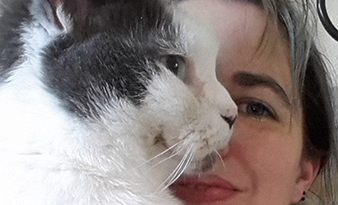What was your first pet?
When I was growing up my parents had a Dachshund called Daisy Belle. My first dog was a mut called Drongo who was “rehomed” onto me by the senior partners wife at my first practice.
What are your favourite animals?
African Wild Dogs, Swallows and Red Kites
What is your funniest vet moment?
On the way into work late at night to operate on a colic, I hit a badger which ran off into the woods so I couldn’t help it. When I made it to the hospital, a visiting German student became quite concerned, asking why was the badger walking along the road at this time of night? It was only when he asked if the badger was the man making sausages, we were able to reassure him that the badger was a black and white animal, and not a butcher…
What is the most memorable or unusual animal you have treated?
A fetlock arthrodesis in Barbados….. on some bales of hay in a tent on the side of the main road.
Bruce Bladon describes his journey from school boy aspirations to be a farm vet to becoming a specialist in equine surgery.
I had nothing to do with horses as a child, indeed I was scared of them until half way through University, (or indeed I still am…). We lived in the Home Counties in a fairly suburban environment. I went to Edinburgh University interested in farm animal work, with the goal of being a dairy vet. But, as I saw practice, I became aware that equine practice was the most interesting, challenging and rewarding branch of veterinary practice. So my career goals changed, and my first job was in small animal and equine practice in Hertfordshire. I moved from there to Salisbury in pure equine practice, and then again in 1992 to Blackman and O’Gorman, as it was then, in Newbury. I had always been interested in surgery, and had spent much energy trying to get a residency post, which finally came to fruition in 1995, when I moved to Bristol University as Resident in Equine Surgery. Back then the ECVS exams were hardly heard of, and my focus was the Royal College Diploma, but I was persuaded by Ian Wright that the the European Boards were a good thing, and took them in 2001.
After Residency I returned to Donnington Grove Veterinary Group, as it is now, the first time the practice had a dedicated surgeon and hospital based clinician. Our case load and referral work has progressively grown, so now there are four specialist surgeons, two internal medics and two imagers, supported by six interns. My work has remained fairly constant though, general equine surgery. Newbury is a big Thoroughbred area so there is plenty of orthopaedic work, both arthroscopy and fracture repairs. But there is plenty of general surgery, and colic surgery remains my absolute favourite. Too many equine surgeons look down on colic surgery, something you have to get out of bed to do, before you become more famous and can specialise in orthopaedics. But to me it remains one of the most challenging of the surgical procedures, and one where you can really make a difference. A surgeon performing colic surgery swiftly with skill and finese will achieve better results than a less able one, and these better results transform quickly into more horses surviving.
Teaching and lecturing has been an integral part of my career. Since I first spoke at a veterinary meeting, the BEVA AGM in 1996, I have relished the challenge of lecturing. It is the culmination of months or years of work: operating on the horses, compiling information about their post operative progress, making sure you have good photographs and videos of the surgical procedures, and then writing and rehearsing the slides. The satisfaction of delivering a good lecture, and knowing that you have got your message across, both informing and entertaining the audience, is immense. I have been lucky to have the opportunity to speak around the world, and have made very good friends in many new places. I have been able to do the full “Lions tour”, speaking at the respective New Zealand, Australian and South African Equine Veterinary Association meetings.
I don’t really get much time away from work. I manage three or four weeks skiing a year, but have to convince my partners at the hospital that these are important CPD meetings. I referee a bit of rugby, which has surprising mental parallels with surgery. You have to go out there and concentrate on nothing else for the duration of the match, and have a good enough knowledge of the law to cope with whatever happens, no matter how unexpected. My children are fairly sport obsessed – ponies for the daughter and athletics for the son, so that can mop up any time left. Though if there is any time to spare, I love to travel. Of all the trips I have done, I think the African bush is the most extraordinary and compelling place.
Find Bruce’s profile here

